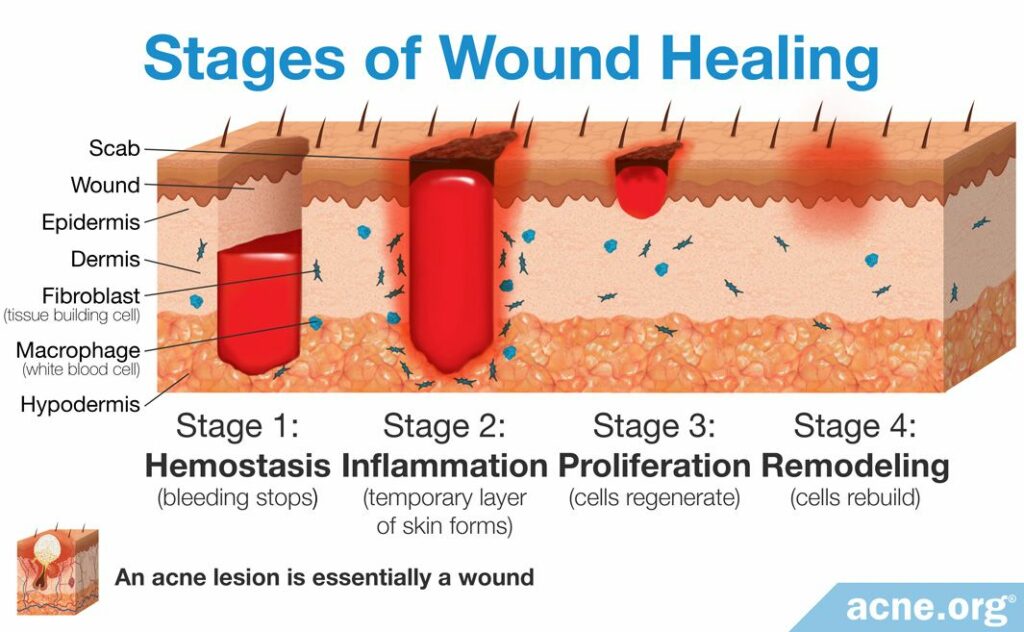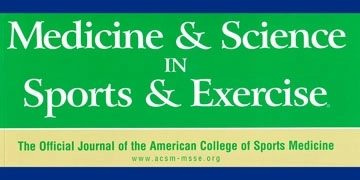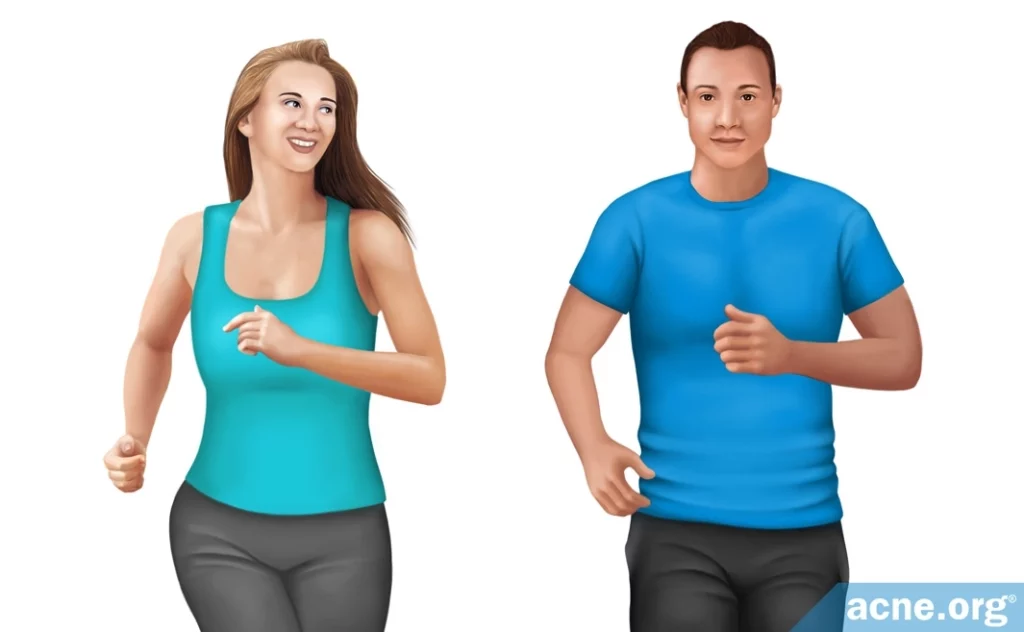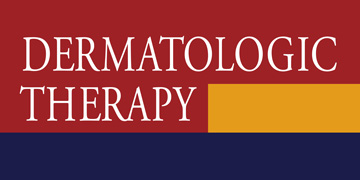Views: 1
Regular, Moderate Exercise May Be Beneficial

The Essential Info
While there are still no studies that look directly at the impact of exercise on acne, indirect evidence points toward a possibility that regular, moderate exercise may improve acne to some degree through improved wound healing and a reduction in inflammation. Since acne lesions, medically speaking, are wounds, and acne is an inflammatory disease, it makes sense that exercise could help.
Exercise is also the best way to keep stress levels under control. Since stress and acne are connected, a regular exercise routine could also help keep acne in check by stabilizing emotions.
Don’t Overdo It: Suddenly starting to engage in intense exercise can overwhelm the body and may have the opposite effect. Start slowly, and work your way up to a more demanding exercise routine.
What about Sweat? Don’t worry about sweat. There is no reason to believe that sweat would have any detrimental effect on acne. In fact, sweat contains a chemical called dermcidin that may help to control acne bacteria.
Tips:
- Physical irritation of the skin can aggravate acne, so when exercising and sweating, take extra care to gently dab your skin with a towel to wick away sweat instead of harshly rubbing the skin with a towel, which could cause irritation.
- Ideally, acne-prone skin should be washed only twice a day. If you shower or wash your face after exercising, try to plan your exercise right before your morning or evening anti-acne regimen.

The Science
There is no direct scientific evidence indicating what effect exercise has on acne. However, indirect evidence suggests that, in general, exercise does not make acne worse and in fact may be beneficial. Let’s have a look at some of the ways exercise might help with acne-related issues.
Exercise May Help Acne Heal

Acne lesions are essentially small wounds. Impaired wound healing can cause pimples to heal more slowly and can make scarring from acne worse.
The Studies: Two studies on mice provide some indirect evidence suggesting that exercise might help the body heal more quickly. While results from animal studies often do not predict human results, these studies show that exercise may improve wound healing, at least in some animal models.1,2
Expand to read details of studies

A 2008 study in the American Journal of Physiology – Regulatory, Integrative and Comparative Physiology compared wound healing in both young and old mice that exercised with mice that did not exercise. This study found that exercise reduced inflammation and accelerated the wound healing process in old mice. Interestingly, while the authors found a mild trend toward improved wound healing in young mice, it was only in old mice that this trend became significant. The authors noted, “Our data suggest that exercise accelerates the wound healing process in old mice. This improved healing response in the old mice may be the result of an exercise-induced anti-inflammatory response in the wound.”1

A similar 2012 study in Medicine and Science in Sports and Exercise investigated whether exercise affected wound healing in obese mice or not. This study found that obese mice that exercised displayed increased wound healing compared to those that didn’t exercise. Interestingly, even though obesity is associated with inflammation, this study found that exercise improved wound healing but that the improvement did not appear to be related to a reduction in inflammation. This finding suggests that something else about exercise might provide benefits of wound healing. The authors noted, “Exercise is known to decrease obesity-associated inflammation and has been shown to speed cutaneous wound healing in aged mice… Surprisingly, we were unable to detect any differences in [pro-inflammatory or anti-inflammatory chemicals] in the wounds… This suggests an effect of exercise independent of alterations in inflammation.”2
Exercise May Help Reduce Inflammation
Acne is at its core an inflammatory disease. Exercise may help keep skin inflammation down through its ability to mitigate an important stressor in the skin called oxidative stress. The more oxidative stress there is, the more inflammation.
More specifically, oxidative stress refers to an imbalance between free radicals in the skin and antioxidants that combat those free radicals. In other words, there are too many free radicals and not enough antioxidants to neutralize them. In the skin, oxidative stress leads to chronic inflammation, which may lead to acne.3
Exercise might help reduce this inflammation, and thus combat acne, by enhancing the natural antioxidant mechanisms that cells use to transform free radicals into harmless molecules.
Scientists also speculate that exercise might help reduce inflammation in the body by promoting the growth of beneficial bacteria in the gut. Recent research suggests that gut bacteria can regulate the immune system and might thereby improve inflammatory diseases like acne.4
Don’t Overdo It
On the other hand, sporadic, intense exercise may actually lead to more oxidative stress and therefore might increase inflammation.5
So does this mean you should avoid intense exercise? No. It simply means if you wish to engage in intense exercise, you should slowly up the intensity. For example, one study showed that intensive exercise itself does not appear to increase inflammation, as long as the exercise is regular and progressive rather than sporadic.6
Expand to read details of study

A 1996 study in Medicine and Science in Sports and Exercise found that patients following a 12-week program of progressive strength training exercises did not show any increase in inflammatory immune responses. The authors concluded, “These data suggest that 12 weeks of high-intensity progressive resistance strength training does not affect immune function in young or elderly healthy individuals.”6 These findings indicate that high-intensity exercise does not increase inflammation if done regularly and in a manner that enables people to adjust easily to the level of exercise.
Exercise Powerfully Reduces Stress

The more stressed out we are, the more likely breakouts become. Deep breathing, meditation, and prayer can all help reduce stress, but exercise is far and away the most effective way to reduce stress. A regular exercise routine is unlikely to completely clear up acne, but it may help.
What about Sweat?
From the evidence we have, sweat should not make acne worse. One small study published in 2008 found that exercise-induced sweat had no effect on acne.7
Expand to read details of study

A 2008 study in Pediatric Dermatology examined the effects of exercise-induced sweat on acne. This study followed 23 adolescent males with truncal acne (acne on the chest and/or back) for two weeks. During the study period, patients exercised hard enough to break a sweat each time for five days per week. This study found no effects of exercise-induced sweat on acne lesion count. In other words, exercising did not worsen or improve acne. The authors noted, “Many patients believe that exercise improves the skin, but some suspect that the associated sweat and dirt exacerbates acne… This small pilot study was not able to show [that exercise-induced sweat has] a significant effect on truncal acne development in physically active boys.”7
While the study mentioned above showed no effect, some evidence indicates that sweat itself may actually help fight acne. Sweat contains a chemical called dermcidin, which is released constantly from sweat glands. Dermcidin possesses antibacterial properties that can kill several types of bacteria, including acne bacteria (C. acnes). Some researchers hypothesize that dermcidin helps keep C. acnes populations under control.
Two recent studies found that people with acne may produce less dermcidin compared to people without acne.8,9 One of these studies also posited that dermcidin might play a role in acne treatment by decreasing acne inflammation.9
Together, these findings suggest that people with acne could benefit from exercising and thus increasing the amount of sweat, and with it the amount of dermcidin, that comes into contact with their skin.
Expand to read details of studies

A 2015 study in Acta Dermato-Venereologica found that dermcidin concentration was significantly lower in acne patients than in people without acne. The authors noted, “This finding suggests that inflammatory acne patients may have a reduced control of the C. acnes population… It is possible that [dermcidin] affects colonization and growth of resident [bacteria]. Sweat mixes with sebum [skin oil] at the openings of pores, where…[dermcidin] and C. acnes may come into contact with each other.”8 This suggests that increased sweat from exercising may enable a larger amount of dermcidin to come into contact with, and therefore help control, C. acnes, which in turn may improve acne.

A 2019 study published in the journal Dermatologic Therapy also found lower dermcidin levels in people with acne compared to people without acne. However, after people with acne underwent a 6-month course of treatment with oral isotretinoin (Accutane®), an oral medication used to treat severe, scarring acne, their dermcidin levels increased significantly. The researchers speculated that one of the ways the medication may have helped with acne is by raising dermcidin levels, which in turn may have reduced inflammation in the skin.9
Conclusion
Exercise has many known health benefits to the body. With respect to acne in particular, regular, moderate exercise may be beneficial by promoting wound healing, reducing inflammation, and keeping stress under control.
Additionally, sweat contains a chemical called dermcidin which has antibacterial properties that can kill acne bacteria, which might, in turn, improve acne symptoms.
Just don’t overdo it. Start slowly and ramp up your intensity gradually.
References
- Keylock, K. T. et al. Exercise accelerates cutaneous wound healing and decreases wound inflammation in aged mice. Am. J. Physiol. Regul. Integr. Comp. Physiol. 294, R179 – 184 (2008). https://www.ncbi.nlm.nih.gov/pubmed/18003791
- Pence, B. D., DiPietro, L. A. & Woods, J. A. Exercise speeds cutaneous wound healing in high-fat diet-induced obese mice. Med. Sci. Sports Exerc. 44, 1846 – 1854 (2012). https://www.ncbi.nlm.nih.gov/pubmed/22543735
- Kruk, J. & Duchnik, E. Oxidative stress and skin diseases: possible role of physical activity. Asian Pac. J. Cancer Prev. 15, 561 – 568 (2014). https://www.ncbi.nlm.nih.gov/pubmed/24568458
- Lancaster, G. I. & Febbraio, M. A. Exercise and the immune system: implications for elite athletes and the general population. Immunol. Cell Biol. 94, 115-116 (2016). https://www.ncbi.nlm.nih.gov/pubmed/26667594
- Al-Shobaili, H. A., Alzolibani, A. A., Al Robaee, A. A., Meki, A. R. & Rasheed, Z. Biochemical markers of oxidative and nitrosative stress in acne vulgaris: correlation with disease activity. J. Clin. Lab. Anal. 27, 45 – 52 (2013). https://www.ncbi.nlm.nih.gov/pubmed/23325743
- Rall, L. C. et al. Effects of progressive resistance training on immune response in aging and chronic inflammation. Med. Sci. Sports Exerc. 28, 1356 – 1365 (1996). https://www.ncbi.nlm.nih.gov/pubmed/8933485
- Short, R. W., Agredano, Y. Z., Choi, J. M. & Kimball, A. B. A single-blinded, randomized pilot study to evaluate the effect of exercise-induced sweat on truncal acne. Pediatr. Dermatol. 25, 126 – 128 (2008). https://www.ncbi.nlm.nih.gov/pubmed/18304176
- Nakano, T. et al. Reduced expression of dermcidin, a peptide active against propionibacterium acnes, in sweat of patients with acne vulgaris. Acta Derm. Venereol. 95, 783 – 786 (2015). https://www.ncbi.nlm.nih.gov/pubmed/25673161
- Alatas, E. T., Kara Polat, A., Kalayci, M., Dogan, G. & Akin Belli, A. Plasma dermcidin levels in acne patients, and the effect of isotretinoin treatment on dermcidin levels. Dermatol. Ther. 32, 13044 (2019). https://pubmed.ncbi.nlm.nih.gov/31364786/
The post How Exercise Might Help with Acne appeared first on Acne.org.

